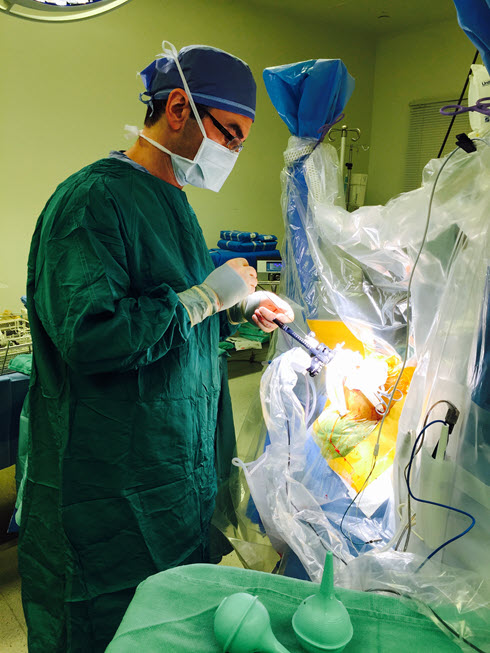What is DBS?
Deep brain stimulation (DBS) is a neurosurgical procedure involving the placement of a medical device called a neurostimulator (sometimes referred to as a “brain pacemaker”), which sends electrical impulses, through implanted electrodes, to specific targets in the brain (brain nuclei) for the treatment of movement disorders, including Parkinson’s disease, essential tremor, and dystonia. While its underlying principles and mechanisms are not fully understood, DBS directly changes brain activity in a controlled manner.
DBS has been approved by the Food and Drug Administration (FDA) as a treatment for essential tremor and Parkinson’s disease (PD) since 1997. DBS was approved for dystonia in 2003, obsessive–compulsive disorder (OCD) in 2009, and epilepsy in 2018. DBS has been studied in clinical trials as a potential treatment for chronic pain for various affective disorders, including major depression. It is one of few neurosurgical procedures that allow blinded studies.
Deep brain stimulation is approved to treat a number of conditions, such as:
- Dystonia
- Epilepsy
- Essential tremor
- Obsessive-compulsive disorder
- Parkinson’s disease
Deep brain stimulation is also being studied as a potential treatment for:
- Addiction
- Chronic pain
- Cluster headache
- Dementia
- Depression (major)
- Huntington’s disease
- Multiple sclerosis
- Stroke recovery
- Tourette syndrome
- Traumatic brain injury
DBS (Deep Brain Stimulation) and Parkinson’s disease (PD)
Parkinson’s disease causes irregular electrical signals in parts of the brain that control movement.
DBS uses electrical stimulation to modulate these control centers deep into the surface of the brain,
improving communication between brain cells.
This helps to reduce symptoms such as tremors, slowness, and stiffness.
DBS is the most commonly performed surgical procedure for symptoms of Parkinson’s disease.
How Parkinson disease effect people
The best explanation is from a person that have Parkinson himself.
Therefore we like to show the this Vlog made by Mr. Ian Frizell on YouTube, who in dept explain what different symptoms and problems Parkinson disease a person can have and that it can show in different ways from person to person.
Parkinson disease is most commonly known for tremors in the hands but it can also include symptoms as Freezing movements, Depression, Pain, cognetive impairment, slowliness and changes in voice/speach.
Some with Parkinson disease are using medication even after a DBS surgery others are not.
For your convenience we post this link to Mr. Ian Frizell´s YouTube chanel if you like to see more of his Vlogs: Ian Frizell
The effects of DBS on the motor symptoms of Parkinson's Disease
Andrew Johnson show on his YouTube Chanel the big changes when the DBS system is turn on and off and the effect it has to his body.
The positive effect clearly also shows with his sense of humor and no depression.
Mr. Johnson´s YouTube Channel can be found here


